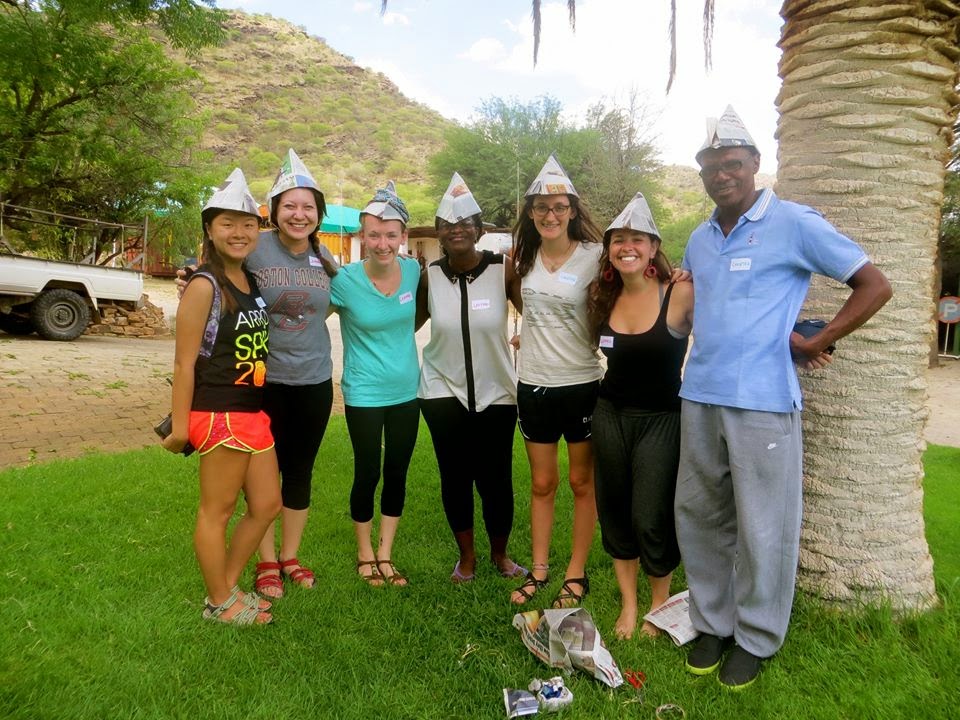By: Molly McPhee and Abbie Lawrence
Imagine you’re standing on the edge of a
pool. It’s a lovely, warm day out and you’re really enjoying the reflection on
the water. Your friend jokingly pushes you in and as you enter the water, you come
face to face with a myriad of fish. You swim around, getting a feel for the
pool, until you decide it’s time to come up for air. However, when you return
to your spot on the edge of the pool, you notice that the surface of the water
is not as pretty or satisfying as you remember it. Despite your comfortable
perch on the side, you realize you have a better view of the fish when you’re
in the water, so you dive in again to swim among them and explore the unknown.
This week was akin to the second plunge. In
Johannesburg, we were pushed into the deep end.
Arriving in Windhoek was our opportunity to come up for air and take a
deep breath. This past week though, we climbed back into the pool at our own
pace, and were able to gain a deeper understanding of the unfamiliar city through
our lens as new community members. Similarly to the magnitude of an ice burg
being discovered beneath the water’s surface, this journey has exposed to us
the complexity of life and the realities behind the assumptions we all have
made thus far. These past days have been
full of digging deeper to confront our unconscious expectations and assumptions.
Assumptions vs. Reality
(PC:
http://getrealphilippines.com/blog/wp-content/uploads/2014/06/iceberg.jpg)
We delved further into understanding our
role as international students here in Windhoek by participating in an
Oshiwambo language class. The class is
designed to prepare us for our rural homestay in March. We took a step deeper
into the pool, and we were excited to welcome in a little piece of the unknown
so that we could begin to connect with one of the many cultures around us.
Although we all have a long way to go before we can confidently speak to
anyone, it was great to start to get a sense of one of the languages we have
heard around us for the past few weeks. Most people in Windhoek speak more than
one language, English being one of them. However for most of us, English is our
primary, and only language. This is a widely known fact, and our teacher actually
had a joke about it. It goes: “What do you call someone who speaks three
languages? Trilingual. What do you call someone who speaks two languages?
Bilingual. What do you call someone who speaks only one language? An American.”
Most Namibians have been incredibly
welcoming and warm and speak to us in English, but as community members, it is not
only important for us to make an effort to acknowledge the traditional
languages of one of the many native cultures, but also to acknowledge that
people often go out of their way to accommodate us. As Americans, we often
unconsciously abuse our privilege when we neglect to learn the language of the
community we are joining, and assume that the people we meet will be able to
speak to us in English. This class will be an opportunity to acknowledge that
privilege and take one step towards more fully immersing ourselves into our new
community.
Molly with our language teacher
Over the course of the week, most of us had
moments of realization that as humans, we don’t know what we don’t know until
we are confronted with the unknown and have an opportunity to work to better
understand our perceptions. We were able to explore this realization more
deeply during a day of activities that we fondly nicknamed “emotional team
building”. Students and staff alike participated in a variety of identity
workshops geared towards getting to know one another as individuals. It quickly
became obvious that we didn’t know each other as well as we thought we did, even
though we had been living together for the past two
weeks. Not only was it useful to get to know one another better, but it was a
great opportunity to confront pieces of our own identities and examine the
impact they have on our individual actions. The day shed light on the
importance of not imposing personal values on other people, but rather
listening to one another in order to gain a better understanding of different
backgrounds people come from, and the many ways in which past experiences shape
worldviews.
The site of our team building activities
Throughout this trip, we have been
confronted with the realities behind some of the assumptions our friends,
families and even ourselves, have previously made about Africa. In fact, it is
not a single country, but an entire diverse continent, and we inhabit only a
small piece. We have just begun to realize the scope of our ignorance, and it
will be exciting to continue to confront the unknown. We will be jumping back
into the pool, as we head to our urban homestays this coming week!
This blog is the work of our students. To learn more about Center for Global Education programming, visit us at www.augsburg.edu/global





No comments:
Post a Comment